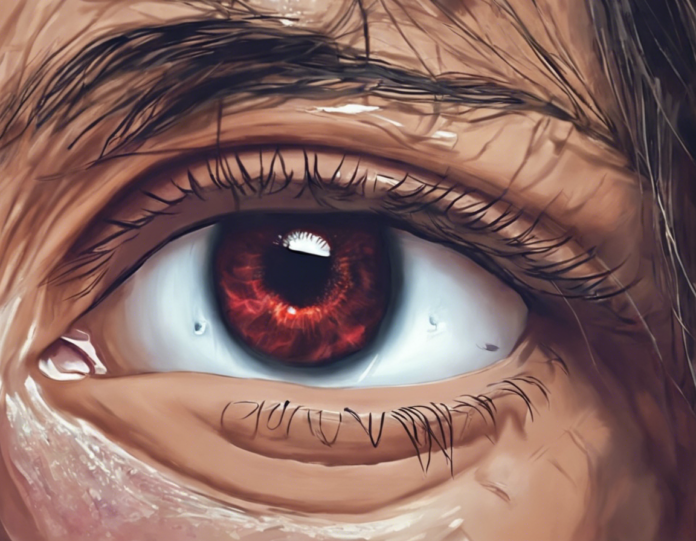Conjunctivitis, commonly known as “eye flu” or “pink eye,” is a highly contagious eye infection that affects the clear tissue covering the white part of the eye and the inner surface of the eyelids. This condition can be caused by a viral or bacterial infection, an allergic reaction, or irritants like chemicals or foreign bodies in the eye. It is essential to recognize the symptoms of conjunctivitis early on to seek appropriate treatment and prevent its spread to others.
Symptoms of Conjunctivitis (Eye Flu)
1. Redness and Irritation
One of the most noticeable symptoms of conjunctivitis is the redness in the white part of the eye (sclera). The eye may also feel itchy or irritated, leading to frequent rubbing.
2. Watery or Discharge
Watery eyes are common in viral conjunctivitis, while bacterial conjunctivitis may cause yellow or green discharge, leading to crusting around the eyes and lashes.
3. Swelling
The eyelids may appear puffy due to inflammation, making it uncomfortable to open or close the eyes fully.
4. Sensitivity to Light
Photophobia, or sensitivity to light, can occur with conjunctivitis, causing discomfort in bright light conditions.
5. Gritty Sensation
A foreign body sensation or a feeling of grit in the eye is common, indicating irritation of the conjunctiva.
6. Blurry Vision
In some cases, conjunctivitis can lead to blurred vision, affecting the clarity of eyesight.
7. Conjunctival Swelling
The conjunctiva may appear swollen or inflamed, giving the eye a pink or reddish hue.
Types of Conjunctivitis
1. Viral Conjunctivitis
Caused by a virus, such as the adenovirus, viral conjunctivitis is highly contagious and can spread through respiratory droplets or direct contact with infected secretions.
2. Bacterial Conjunctivitis
Caused by bacteria, like Staphylococcus aureus or Streptococcus pneumoniae, bacterial conjunctivitis can lead to more severe symptoms and requires antibiotic treatment.
Treatment and Management
1. Home Remedies
- Warm Compresses: Applying a warm compress to the eyes can help relieve discomfort and reduce crusting.
- Eye Drops: Over-the-counter artificial tears can help lubricate the eyes and wash away irritants.
- Avoiding Contact Lenses: Contact lens wearers should switch to glasses until the infection clears up.
2. Medical Treatment
- Antibiotics: Bacterial conjunctivitis may require antibiotic eye drops or ointments prescribed by a healthcare provider.
- Antiviral Medications: In the case of severe viral conjunctivitis, antiviral medications may be necessary to manage the infection.
3. Preventive Measures
- Hand Hygiene: Regular handwashing can prevent the spread of infection, especially after touching the eyes.
- Avoiding Touching the Eyes: Refrain from rubbing or touching the eyes to prevent further irritation and spread of the infection.
FAQs (Frequently Asked Questions)
1. Is conjunctivitis contagious?
Yes, conjunctivitis can be highly contagious, especially viral and bacterial forms. Proper hygiene and avoiding close contact with infected individuals are crucial to prevent its spread.
2. Can I wear makeup with conjunctivitis?
It is best to avoid wearing makeup, especially eye makeup, during conjunctivitis to prevent further irritation and contamination. Discard old makeup to prevent reinfection.
3. How long does conjunctivitis last?
The duration of conjunctivitis can vary depending on the cause. Viral conjunctivitis may resolve on its own within a week or two, while bacterial conjunctivitis may require antibiotic treatment and last longer.
4. Can I go to work or school with conjunctivitis?
It is advisable to stay home until the infection clears to prevent spreading it to others. Consult a healthcare provider for guidance on when it is safe to return to work or school.
5. Can conjunctivitis cause permanent eye damage?
In most cases, conjunctivitis resolves without causing lasting damage to the eyes. However, complications can occur, especially if left untreated, leading to potential vision problems.
Conclusion
Recognizing the symptoms of conjunctivitis early on is crucial for prompt treatment and preventing its spread to others. Whether viral, bacterial, or allergic in nature, conjunctivitis can cause discomfort and vision disturbances, making it essential to seek appropriate medical care. By following proper hygiene practices, utilizing home remedies, and seeking medical guidance when needed, individuals can effectively manage eye flu and promote faster recovery.





